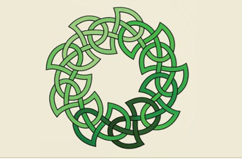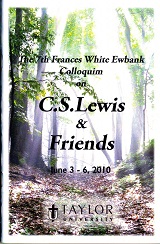Event Title
Academic Paper Session III-C
Location
Rupp 205
Start Date
5-6-2010 9:30 AM
Description
"Owen Barfield: Unregressed Pilgrim" - Edwin Woodruff Tait
This paper will use C.S. Lewis’s The Pilgrim’s Regress to compare Lewis’s understanding of the spiritual life with that of Own Barfield. I will argue that the eponymous “regress” reflects Lewis’s belief (post-conversion) that the imagination did indeed point to truth, but that this truth could not be reached by the imagination directly but only by a humble submission to the eternal truth of historic, orthodox Christianity. Barfield, on the other hand, continued to believe that one could (using the terms of the Regress) sail directly to the Island in the West without returning to the “Landlord’s Castle.”
"Truth and Imagination in Poetic Diction: Owen Barfield and C.S. Lewis's Great War - Stephen Margheim
Owen Barfield’s position in his “Great War” with C.S. Lewis holds that the imagination can both perceive and create truth via poetry. Contrarily, Lewis’s position in the “war,” which took place during the 1920s before his conversion to Christianity, holds that the imagination can in no way create truth. This paper explicates Barfield’s position and arguments as well as Lewis’s objections in order to demonstrate how Barfield is victorious in the war. I examine Barfield’s understanding of the natures of imagination and truth as seen in Poetic Diction, and subsequently turn to his arguments for imagination’s passive and active relationship with truth. I also consider Lewis’s objections to these two arguments based on his own views of the natures of imagination and truth. Finally I provide a case for Barfield’s victory by examining this theory of imagination in Poetic Diction and by demonstrating Lewis’s implicit surrender post-conversion.
Event Type
Paper
Academic Paper Session III-C
Rupp 205
"Owen Barfield: Unregressed Pilgrim" - Edwin Woodruff Tait
This paper will use C.S. Lewis’s The Pilgrim’s Regress to compare Lewis’s understanding of the spiritual life with that of Own Barfield. I will argue that the eponymous “regress” reflects Lewis’s belief (post-conversion) that the imagination did indeed point to truth, but that this truth could not be reached by the imagination directly but only by a humble submission to the eternal truth of historic, orthodox Christianity. Barfield, on the other hand, continued to believe that one could (using the terms of the Regress) sail directly to the Island in the West without returning to the “Landlord’s Castle.”
"Truth and Imagination in Poetic Diction: Owen Barfield and C.S. Lewis's Great War - Stephen Margheim
Owen Barfield’s position in his “Great War” with C.S. Lewis holds that the imagination can both perceive and create truth via poetry. Contrarily, Lewis’s position in the “war,” which took place during the 1920s before his conversion to Christianity, holds that the imagination can in no way create truth. This paper explicates Barfield’s position and arguments as well as Lewis’s objections in order to demonstrate how Barfield is victorious in the war. I examine Barfield’s understanding of the natures of imagination and truth as seen in Poetic Diction, and subsequently turn to his arguments for imagination’s passive and active relationship with truth. I also consider Lewis’s objections to these two arguments based on his own views of the natures of imagination and truth. Finally I provide a case for Barfield’s victory by examining this theory of imagination in Poetic Diction and by demonstrating Lewis’s implicit surrender post-conversion.


